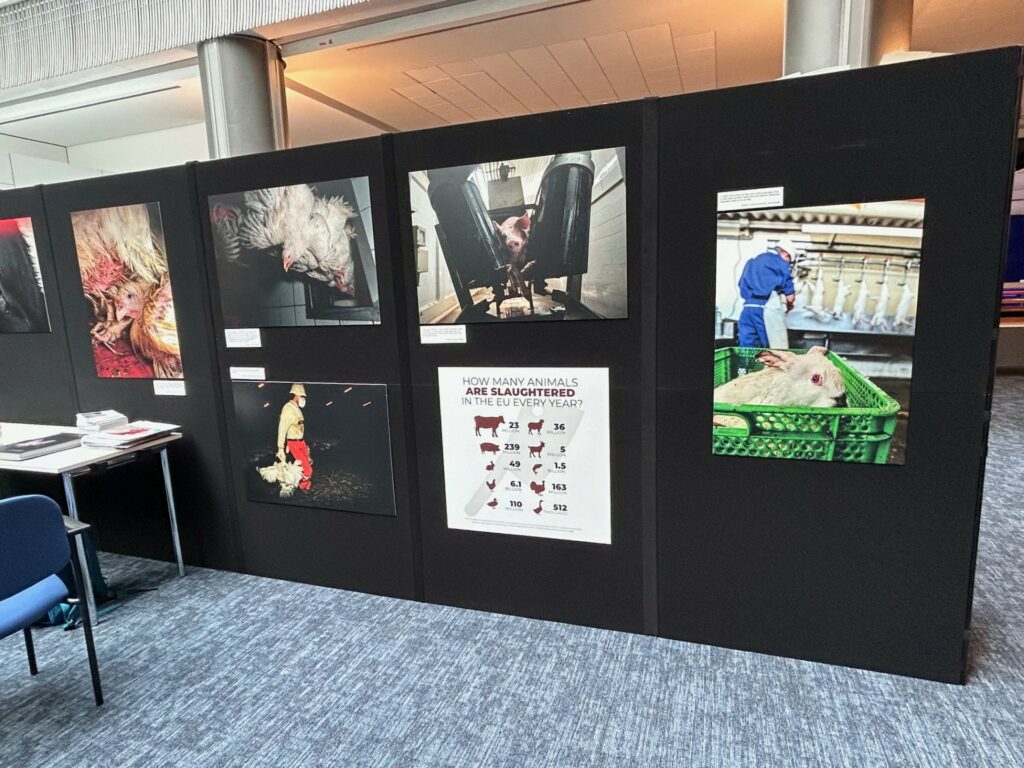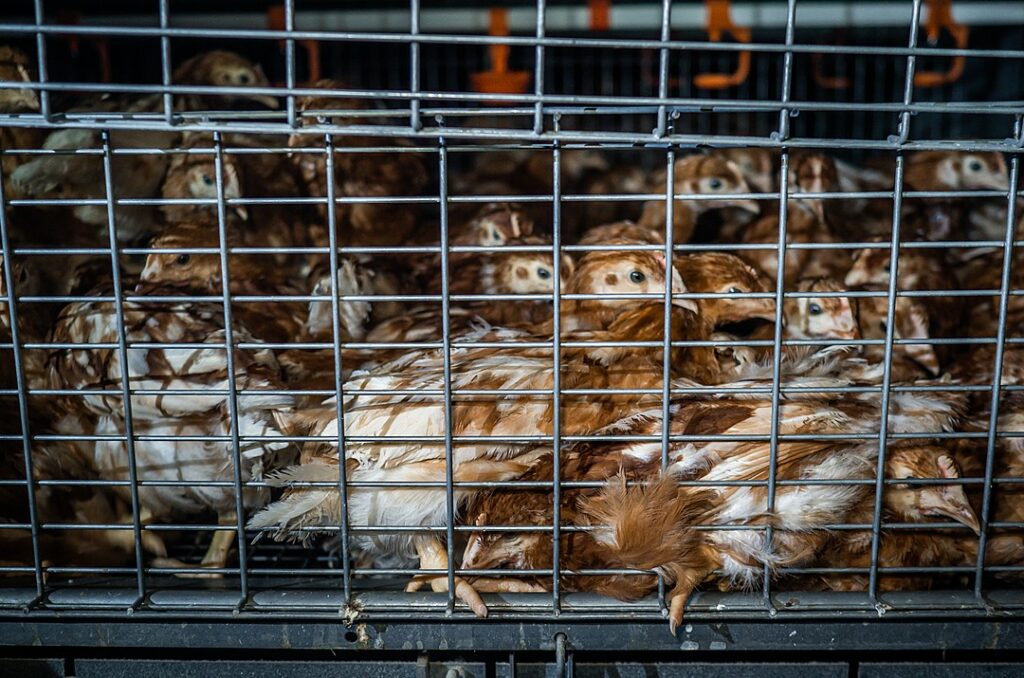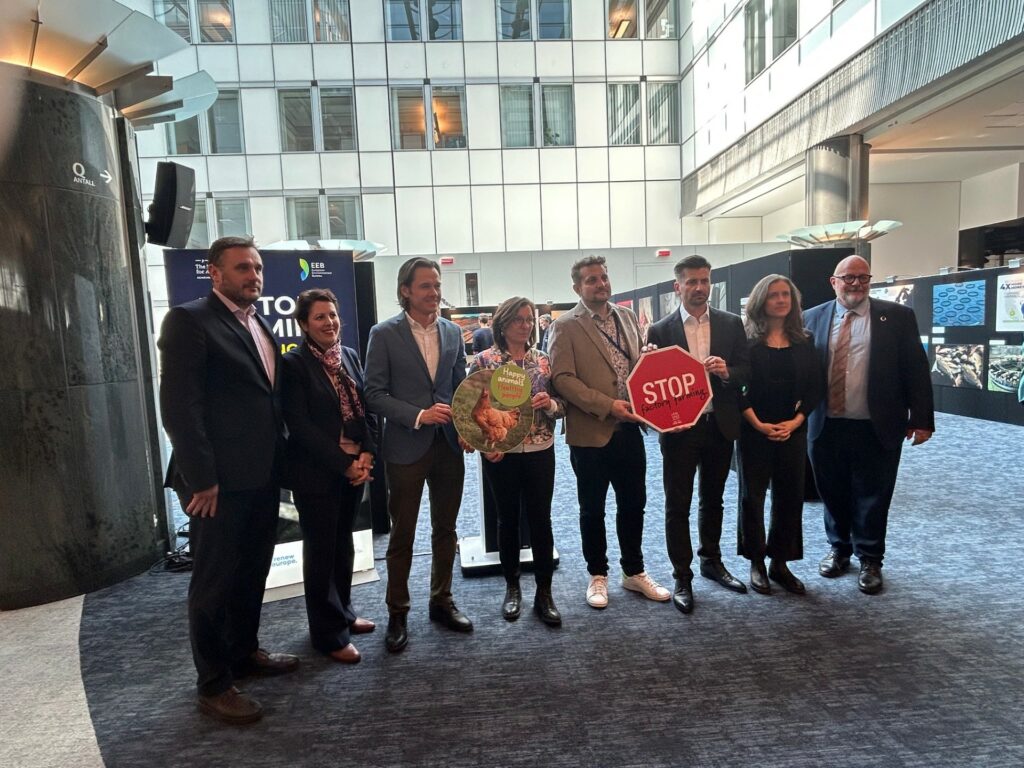The stark reality of farmed animals across Europe differs from the idyllic perception of farms, with open fields and animals roaming freely in harmony between nature and agriculture, according to a photography exhibition at the European Parliament.
To uncover the true face of factory or intensive industrial farming, the European Institute for Animal Law and Policy and the European Environmental Bureau on Tuesday launched the exhibition “Factory Farming: Unveiling the Hidden Costs” (24-27 March 2025).
The exhibition was hosted by MEPs from five political party groups in the Parliament: Tilly Metz (Greens/EFA), Manuela Ripa (EPP), Krzysztof Śmiszek (S&D), Michal Wiezik (Renew), and Anja Hazekamp (GUE/NGL),
From animals’ extreme confinement to environmental devastation and the neglect of rural communities, the works from 12 photojournalists across 13 EU countries, including the award-winning Jo-Anne McArthur, reveal the true cost of factory farming on animals, human health, and ecosystems.
"In factory farms, animals are turned into production machines,” commented Olga Kikou, Director of Advocacy at The European Institute of Animal Law & Policy and one of the organizers of the ‘End the Cage Age’ European Citizens’ Initiative.
“Being forced to live in high concentrations in unnatural social groups leads to behavioural problems and the spread of disease. Animals have no contact with the outdoors, are fed human-edible crops and are often sick. The physiological and psychological issues stemming from these systems lead the industry to adopt 'quick fixes', such as cages or mutilations.”
Factory farming is mostly associated with on-the-farm conditions with animals confined in cages, crates, and other small spaces. Olga Kikou told The Brussels Times that it is also part of a bigger industrial picture involving live animal transports and slaughter in big slaughterhouses with ineffective and painful stunning methods.

According to a Eurobarometer in 2023, 91 % of Europeans think farmed animal welfare is important, 84% believe it should be better protected, and 67% want more information on animal farming conditions.
“These images and stories are where they need to be: before the change makers,” Jo Anne McArthur said at the opening of the exhibition. “Photojournalists and policy makers have always had strong partnerships. We are seeing that here today, for animals.”
“This is about the water we drink,” MEP Tilly Metz explained. “The soils we need to plant our fruits and vegetables. The air we breathe. It’s about the people who live close to these factories and work beside them. It’s about our own health and the health of everyone around us. This is about compassion, about ethics, about the livability of this planet for future generations.”
“We’ve been promised the End the Cage Age by the European Commission and it needs to come,” reminded MEP Niels Fuglsang.

Densely housed young hens look out through the wires of the cage they live in at a farm in the Czech Republic, credit: Lukas Vincour/Zvirata Nejime/We Animals Media
The European Citizens’ Initiative gathered 1.4 million signatures from across the EU and is the only Initiative that prompted the European Commission to commit to implementing all its requests. However, the Commission failed to propose a ban on cages by the 2023 deadline, leading the organisers to take legal action.
The exhibition covers among others health risks and the impact of factory farming on climate change. Factory farming accounts for 93 % of ammonia emissions in the EU and are breeding grounds for diseases that pose risks for public health.
Already at the UN Climate Change Conference (COP27) in 2022 at Sharm el-Sheikh, Egypt, animal welfare NGO Compassion in World Farming launched a campaign to end factory farming and transform the global food system.
In February this year, the European Commission presented a vision for agriculture and food which it described as an ambitious roadmap on the future of farming and food in Europe. However, the word ‘factory farming’ was missing and the importance of animal welfare was downgraded in the document.
The Policy demands:
|
M. Apelblat
The Brussels Times

